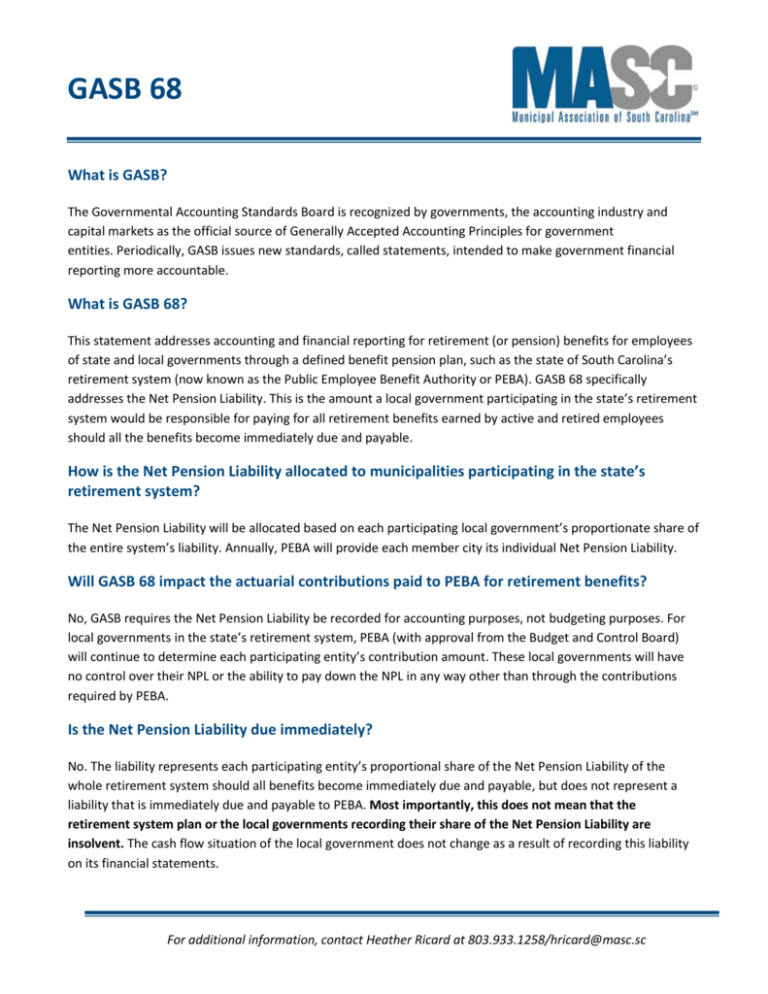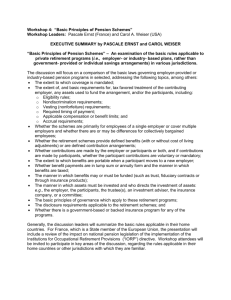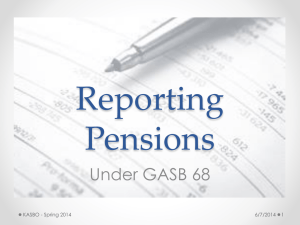GASB 68 - Municipal Association of South Carolina
advertisement

GASB 68 What is GASB? The Governmental Accounting Standards Board is recognized by governments, the accounting industry and capital markets as the official source of Generally Accepted Accounting Principles for government entities. Periodically, GASB issues new standards, called statements, intended to make government financial reporting more accountable. What is GASB 68? This statement addresses accounting and financial reporting for retirement (or pension) benefits for employees of state and local governments through a defined benefit pension plan, such as the state of South Carolina’s retirement system (now known as the Public Employee Benefit Authority or PEBA). GASB 68 specifically addresses the Net Pension Liability. This is the amount a local government participating in the state’s retirement system would be responsible for paying for all retirement benefits earned by active and retired employees should all the benefits become immediately due and payable. How is the Net Pension Liability allocated to municipalities participating in the state’s retirement system? The Net Pension Liability will be allocated based on each participating local government’s proportionate share of the entire system’s liability. Annually, PEBA will provide each member city its individual Net Pension Liability. Will GASB 68 impact the actuarial contributions paid to PEBA for retirement benefits? No, GASB requires the Net Pension Liability be recorded for accounting purposes, not budgeting purposes. For local governments in the state’s retirement system, PEBA (with approval from the Budget and Control Board) will continue to determine each participating entity’s contribution amount. These local governments will have no control over their NPL or the ability to pay down the NPL in any way other than through the contributions required by PEBA. Is the Net Pension Liability due immediately? No. The liability represents each participating entity’s proportional share of the Net Pension Liability of the whole retirement system should all benefits become immediately due and payable, but does not represent a liability that is immediately due and payable to PEBA. Most importantly, this does not mean that the retirement system plan or the local governments recording their share of the Net Pension Liability are insolvent. The cash flow situation of the local government does not change as a result of recording this liability on its financial statements. For additional information, contact Heather Ricard at 803.933.1258/hricard@masc.sc Should the Net Pension Liability be included in a city’s annual budget? No, the expense and liability amounts recorded in the local government’s financial statements should not be used for budgeting purposes as they will likely be more volatile due to changes in the actuarial calculations. Municipalities should continue to use the statutorily determined contribution amounts set by PEBA for budgeting purposes. What is included in the Net Pension Liability calculation? The liability calculation includes many variables, including interest rate assumptions on the investments of the retirement system, projections for salary increases, assumptions for future service, and mortality assumptions examined during each actuarial valuation. These assumptions can have a material impact on the liability amount. The local government participants in the retirement system do not get to choose the assumptions used during the valuation process. The NPL also includes the unfunded portion of retirement benefits earned for all years of past service. The NPL also includes the impact of investment losses and ad hoc COLAs given without adequate funding. The liability also includes projections for employees who may not ever retire from the state’s retirement system. The volatility of the stock market in the early 2000s and the more recent economic recession has had an impact on the funded ratio of the state’s retirement system. However, over time the performance of the system has been favorable with plan returns often exceeding actuarial assumptions. The plan continues to be solvent and the additional steps PEBA is taking will help improve the funded ratio of the plan over time. What steps has the state taken to reduce the Net Pension Liability? PEBA has taken steps in the past few years to reduce the NPL by increasing the contribution requirements of participants in the program, eliminating the TERI program at the direction of the General Assembly and increasing vesting requirements to name a few. For additional information, contact Heather Ricard at 803.933.1258/hricard@masc.sc









